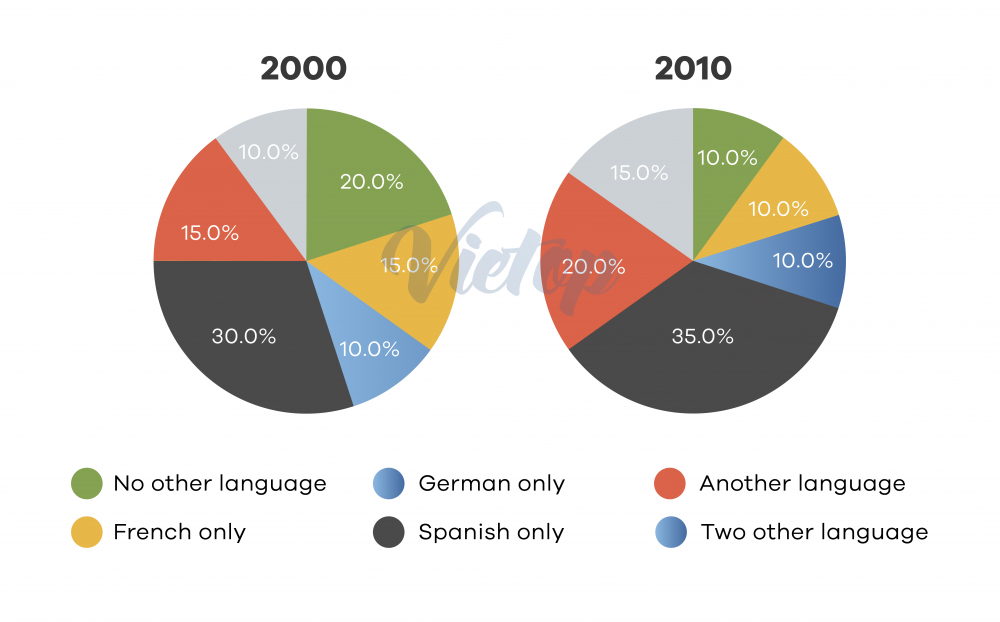Tính đến nay, các sĩ tử đã ôn được bao nhiêu đề IELTS rồi nhỉ? Luyện IELTS rất mệt, nhưng hãy cố lên nhé.
Dưới đây Vietop gửi đến các bạn bài mẫu IELTS Writing về chủ đề Learning languages, đây là một chủ đề khá đơn giản, nhưng liệu có “đơn giản” thật hay không? Tham khảo ngay nhé!
IELTS Writing Task 1
| Task 1: The charts below show the proportions of British students at one university in England who were able to speak other languages in addition to English, in 2000 and 2010. |

Xem thêm:
Trọn bộ đề IELTS Writing task 1 và IELTS Writing Task 2 qua từng năm
Khóa học IELTS và luyện thi IELTS cấp tốc được nhiều bạn tại TPHCM theo học nhất – Cùng tìm hiểu ngay nhé
Sample
The pie charts show the percentages of British students from a single English institution who could speak languages other than English in 2000 and 2010.
Overall, the proportion of students who could communicate in other languages followed an upward trend toward the year 2010, with Spanish being the most often spoken language in both years.
In both 2000 and 2010, those who only spoke Spanish made up the largest share of undergraduates, accounting for 30% and 35%, respectively. Those who spoke another language and those who spoke two other languages grew to be the second and third major categories in 2010, with increases of 20% and 15%, respectively. In comparison, the share of people who spoke no other languages fell by half, to 10%.
Among individuals who could speak additional languages, French-only speakers were the only group whose share fell from 15% to 10%, while German-only speakers remained at 10%.
Xem ngay: Cách đọc Bảng nhiều dữ liệu trong IELTS Writing task 1
IELTS Writing Task 2
| Task 2: Some children do not have the ability for learning languages. Therefore schools should not make children do that. Do you agree or disagree? |
Sample
Some argue that because learning a foreign language is difficult for youngsters, schools should not promote it. The issue, in my opinion, is the sole reason for promoting second language education which would be discussed during the essay before coming to a rational conclusion.
According to contemporaries, the majority of youngsters are simply incapable of acquiring a second language. The finest evidence for this is anecdotal, and it pertains to the increased workload imposed on young children. Schools are open for long hours in many areas of the world, particularly in high-achieving countries such as South Korea and Japan, where pupils study a wide range of subjects. They are often taught English, the world’s major language, which is particularly challenging for speakers of Asian languages because there is little shared linguistic background. As a result, students frequently squander time, feel frustrated, and lack self-esteem.
Children, on the other hand, may acquire languages faster than adults, and the difficulty given is a significant lesson in and of itself. Once schools engage in adequate training and employ interesting materials, the lectures would be less dull and the chances of success will be higher. Language acquisition is most successful before the age of seven, according to research, with pronunciation being a stumbling obstacle for older learners who already have set vocal structures. Furthermore, the challenge of learning a language motivates youngsters to study harder and stretch their abilities to learn in novel ways. This applies to all courses, but languages stand out because students can and should seek out innovative memorizing strategies and experience the world through new perspectives.
In conclusion, despite the poor success rates in many circumstances, the influence of attempting to learn a language is enormously helpful in and of itself. As a result, schools should continue to subsidize this aspect of the curriculum.
Có thể bạn quan tâm: 6 từ nối nên dùng trong IELTS Writing Task 2
Vocab
- Incapable of (adj): không có khả năng
- Anecdotal (adj): mang tính chủ quan, thiếu căn cứ
- Squander (v): phung phí
- In and of itself: do chính bản thân việc đó
Vietop hy vọng bài mẫu về chủ đề Learning languages trên sẽ giúp ích được bạn trong quá trình ôn tập IELTS. Nếu bạn có thắc mắc về bài mẫu trên thì hãy để lại bình luận bên dưới để chúng mình giải đáp nhé! Chúc bạn học tốt!
Xem thêm:
Bài mẫu IELTS Writing Task 1 + 2 – Topic: Line + Environment
Bài mẫu IELTS Writing task 1: Describe how a bicycle operate

![[ACE THE TEST] Giải đề IELTS Writing ngày 13/04/2024 2 [ACE THE TEST] Giải đề IELTS Writing ngày 13/04/2024](https://www.ieltsvietop.vn/wp-content/uploads/2024/04/giai-de-ielts-writing-ngay-13-04-2024.jpg)
![[ACE THE TEST] Giải đề IELTS Writing ngày 06/04/2024 3 [ACE THE TEST] Giải đề IELTS Writing ngày 06/04/2024](https://www.ieltsvietop.vn/wp-content/uploads/2024/04/giai-de-ielts-writing-ngay-06-04-2024.jpg)
![[ACE THE TEST] Giải đề IELTS Writing ngày 23/03/2024 4 Giải đề IELTS Writing ngày 23/03/2024](https://www.ieltsvietop.vn/wp-content/uploads/2024/03/giai-de-ielts-writing-ngay-23-03-2024-thumb.jpg)
![[ACE THE TEST] Giải đề IELTS Writing ngày 16/03/2024 5 [ACE THE TEST] Giải đề IELTS Writing ngày 16/03/2024](https://www.ieltsvietop.vn/wp-content/uploads/2024/03/giai-de-ielts-writing-ngay-16-03-2024.jpg)
![[ACE THE TEST] Giải đề IELTS Writing ngày 07/03/2024 6 [ACE THE TEST] Giải đề IELTS Writing ngày 07/03/2024](https://www.ieltsvietop.vn/wp-content/uploads/2024/03/giai-de-ielts-writing-ngay-07-03-2024.jpg)
![[ACE THE TEST] Giải đề IELTS Writing ngày 09/03/2024 7 [ACE] Giải đề IELTS Writing ngày 09/03/2024](https://www.ieltsvietop.vn/wp-content/uploads/2024/03/giai-de-ielts-writing-ngay-09-03-2024-thumb.jpg)



